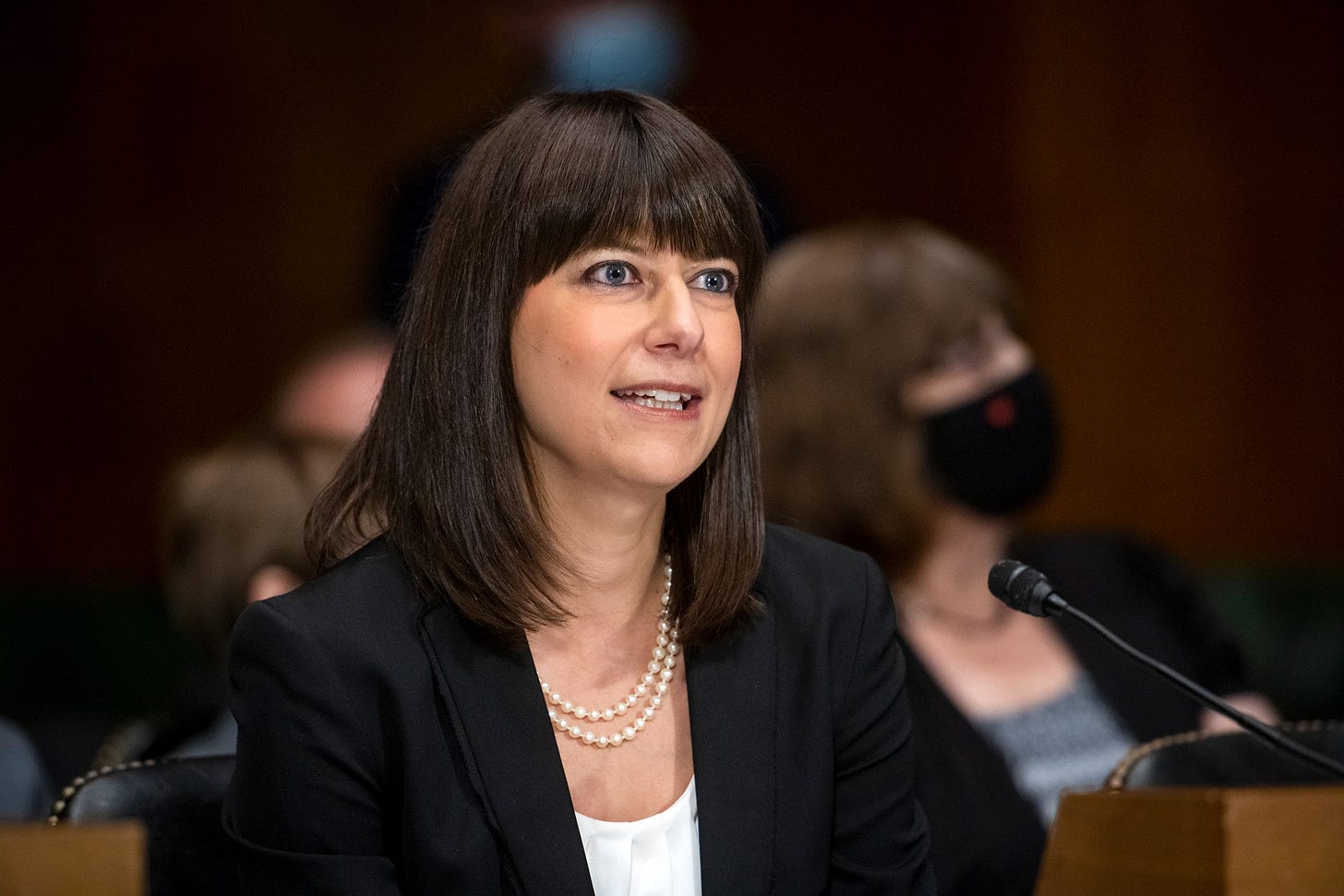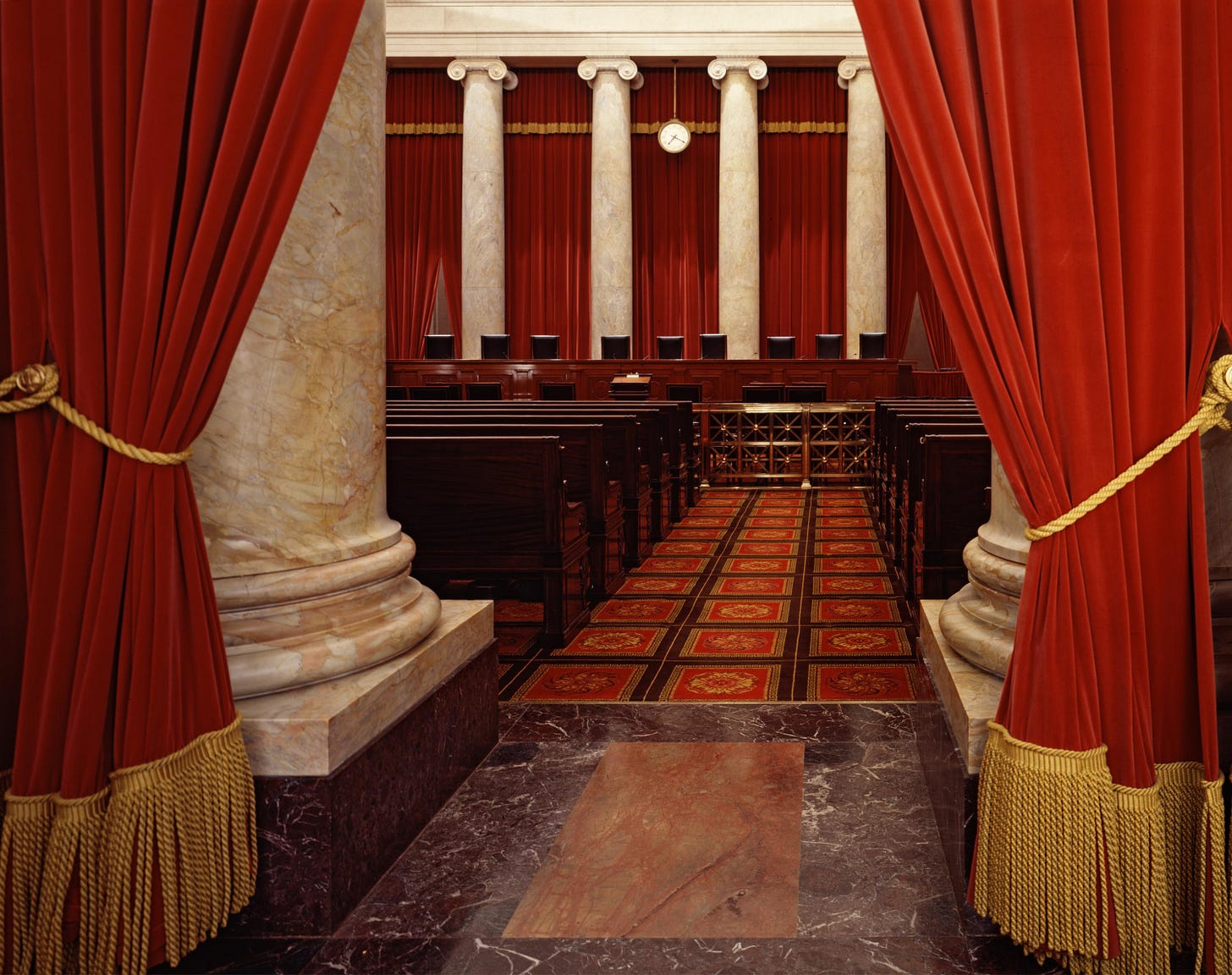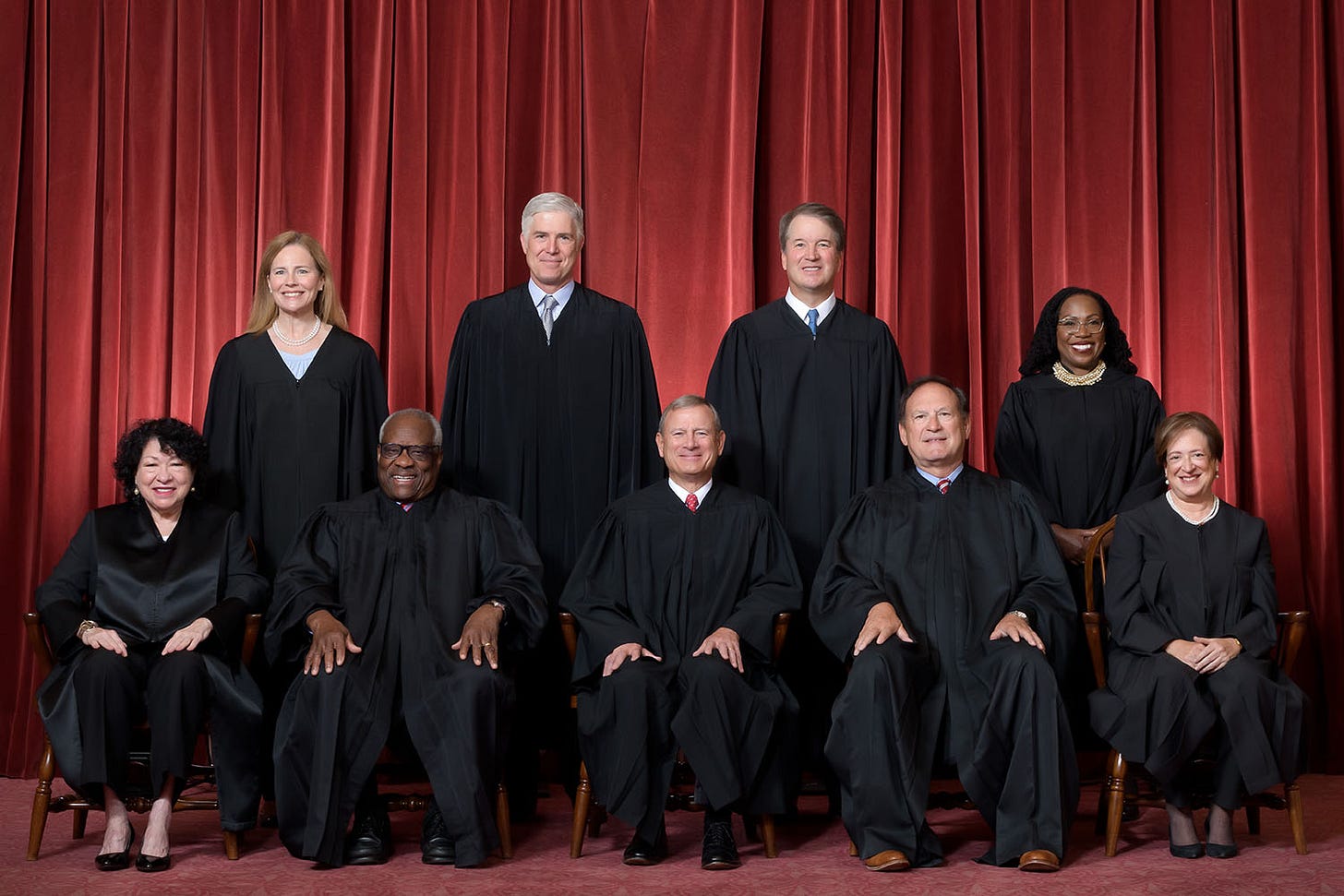Will TikTok Be Banned?
What happened inside the Supreme Court, from someone who was there.
Statistically speaking, if you’re reading this, there’s a good chance you use TikTok.
The app boasts more than 170 million American users — just about half of the U.S. population. The fastest-growing social media platform in history, in a mere eight years, TikTok has become ubiquitous in American culture: elevating new celebrities, cementing trends, selling products, and even helping shape how the country thinks and learns about its politics.
Now, it could all come crashing down, even more quickly than it emerged.
Under a bipartisan law signed by President Biden last year, TikTok’s Chinese parent company, ByteDance, has until this Sunday to either sell the app or face a ban from American app stores.
As that key deadline approaches, the Supreme Court heard oral arguments in TikTok v. Garland last Friday, hashing out whether the law is a violation of the First Amendment. The court is expected to issue its decision any day now, deciding TikTok’s fate in the U.S.
I was in the courtroom on Friday, one of about 30 reporters who watched as lawyers for TikTok and the Biden administration squared off. Here’s what I saw.
First Amendment vs. national security
Not just anyone can argue cases before the Supreme Court, and the TikTok hearing featured three of the country’s most experienced SCOTUS advocates: Elizabeth Prelogar, defending the Biden administration in her role as U.S. Solicitor General (the government’s top lawyer); Noel Francisco, who had that same job in the Trump administration, representing TikTok; and Jeffrey Fisher, a Stanford law professor who defended a group of TikTok creators who are also challenging the law.
Francisco was up first.
His main argument was that — even though ByteDance is a Chinese company — TikTok is incorporated in America as a U.S. subsidiary, which means it has the same First Amendment rights as any American company. He charged that the U.S. sought to ban the law solely out of fear of the ideas that might crop up on the platform.
“This case ultimately boils down to speech,” Francisco told the justices. “What we’re talking about is ideas. And my friends on the other side, when you cut through everything else, are ultimately worried that the ideas that appear on the TikTok platform could in the future somehow manipulate Americans, could somehow persuade them, could somehow get them to think something that they ought not be thinking.”
“Well, that whole notion is at war with the First Amendment. If the First Amendment means anything, it means that the government cannot restrict speech in order to protect us from speech.”
Then came Fisher, who argued that not only did a TikTok ban infringe on the company’s free speech — but it violated the freedoms of the app’s users as well. “American creators have long and always enjoyed the right to speak in conjunction with foreign speakers or work with foreign publishers,” he pointed out.
That might make it sound simple — but simple cases don’t reach the Supreme Court. The First Amendment isn’t absolute, and the court has long acknowledged that the government can limit certain speech in the name of national security. (A government official doesn’t have the free speech right, for example, to leak classified information. Or to use the most classic example, you can’t falsely yell “fire!” in a crowded theater.)
The Constitution does tell Congress to protect free speech… but also to “provide for the common Defence and general Welfare” of the people. What happens when those two goals are in tension?
When it was her turn to speak, Prelogar urged the justices to focus on the national security aspect, laying out the case for TikTok to be banned if it isn’t sold by its Chinese owners. “TikTok's immense data set would give [China] a powerful tool for harassment, recruitment, and espionage,” she argued. “On top of that, the Chinese government's control over TikTok gives it a potent weapon for covert influence operations.”
The law wasn’t intended to “suppress specific types of content or specific types of viewpoints,” she argued — which is why it doesn’t ban TikTok flat-out. The app could carry on exactly as it is, she pointed out, with the exact same speech and content, as long as it severed ties to the Chinese government that could allow Beijing to spy on or influence Americans.
After each attorney spoke, the nine justices of the Supreme Court battered them with questions. Sometimes, the tone of their questioning can give a clue as to how the justices are feeling about a case. Although you can never be sure with SCOTUS, on Friday, their questions definitely made it seem like they were leaning towards upholding the anti-TikTok law.
“Congress doesn’t care about what’s on TikTok,” Chief Justice John Roberts, a conservative, said at one point. “They don’t care about the expression. That’s shown by the remedy: they’re not saying TikTok has to stop, they’re saying that the Chinese have to stop controlling TikTok.”
Most of the liberal justices made similar comments; some even pushed back on the idea that the First Amendment was relevant at all, since ultimately the law refers to an overseas company, not anyone in America. “I guess what I’m suggesting is that the law is only targeted at this foreign corporation” — ByteDance — “which doesn’t have First Amendment rights,” Justice Elena Kagan, a liberal, said. “Whatever effect it has, it has.”
It went on like this for more than two hours, running well past the allotted time.
As the black-robed justices asked their questions, they peered down at the lawyers — and the rest of us — from their imposing bench. The chamber is grand (24 marble columns, 44-foot-high ceilings). Everyone is hushed and wearing their best. (When reporters are credentialed to enter the court, they are reminded that “there is a dress code in the press section, which we interpret as business attire for women and a coat and tie for men.” At the Supreme Court, even the dress code is a matter of interpretation.)
But despite all that, the justices are sometimes casual. The proceedings aren’t televised— and the justices take advantage of it. While some were leaning forward during the arguments, Justices Clarence Thomas and Samuel Alito rocked back and forth in their chairs absentmindedly. At several points, Thomas leaned far back, looking almost asleep as he stared at the ceiling.
Several of the justices are in their 60s and 70s; Kagan, in the past, has even acknowledged that they are “not the nine greatest experts on the internet.” Still, they represented themselves well on Friday, talking about things like open-source code and algorithms. Kagan looked especially proud of herself after name-checking one of the newer social media platforms, BlueSky, in what was presumably the website’s first Supreme Court mention.
Supreme Court lawyers and justices love using hypotheticals to make their points, and plenty were thrown out on Friday. Fisher, for example, compared TikTok to a bookstore trying to sell a foreign publication. “Let me put it to you this way,” he explained. “The Communist Manifesto written by Karl Marx has no First Amendment standing on its own in America, but if a bookstore wants to sell that publication, I don’t think Congress can prevent it from doing so.”
Justice Brett Kavanaugh, meanwhile, offered a darker possibility: “I think Congress and the president were concerned that China was accessing information about millions of Americans, tens of millions of Americans, including teenagers, people in their 20s, that they would use that information over time to develop spies, to turn people, to blackmail people, people who, a generation from now, will be working in the FBI or the CIA or in the State Department.”
TikTok is more than a mere book, after all. Would the U.S. have let Russia control CBS News at the height of the Cold War? Probably not. Now imagine CBS could collect data on its users, and you get an idea of the fears the government was outlining.
What happens now?
We wait.
I trekked back to the Supreme Court on Wednesday, just in case the justices announced their opinion in the TikTok case. They didn’t, handing down rulings on a minimum wage case and a pet food case (no, really!). But nothing on the case 170 million Americans (and two of the world’s most powerful governments) are waiting to hear about.
The justices have until Sunday to intervene; if they don’t do anything by then (or if they uphold the law), TikTok will “go dark” in the U.S., Francisco told them. What that will look like isn’t exactly clear. Technically speaking, the law probably only requires app stores to stop letting U.S. users download new versions of TikTok, meaning existing users could theoretically keep
But, according to Reuters, the app plans to make a point by shutting down in the U.S. entirely, in order to make its users feel the impact of the law — in hopes that they will pressure Washington to reverse it. If the justices uphold the ban, and TikTok follows through with that plan, it will mark a huge shift in the U.S. technological, cultural, and political landscape, as tens of millions of Americans look for a new forum. (Some are already going to another Chinese-owned alternative.)
There is another dimension to consider here, however: the app would be set to shut down on January 19, one day before President-elect Trump is poised to take office. Trump is the OG TikTok ban proponent: he tried to remove the app from U.S. app stores back in 2020, citing the same fears about Chinese data collection. Now, however, he is pledging to save the app, which he credits with having helped elect him.
Trump might be able to pause the ban after it takes effect, as I detailed in another newsletter here, but any of his options come with legal pitfalls. Some lawmakers — including Sen. Ed Markey, who I spotted at the court on Friday, repeatedly fidgeting with a face mask — have proposed delaying the Sunday deadline, but it’s unlikely the sweeping bipartisan majority that backed the original law would get behind that.
That means TikTok’s time is ticking. Get your dance videos in while you still can.
Editor’s note: As of 11:30 pm central on Jan 15, 2025, Biden administration officials were reportedly looking for ways to keep the ban from going into effect on Jan 19, despite Biden signing the law that banned it to begin with. It’s unclear what tools the administration has at their disposal to stop this from happening. This comes after a last-ditch effort to delay the implementation of the law failed in Congress.









Where did the concern that ByteDance is associated with the Chinese government come from? Are they? If a ban took place, does that prevent Americans from having any app that is made by a Chinese company? Has China done anything to infer they’ve collected TikTok data to use in some way? I obviously have lots of questions. My TikTok algorithm shows book recommendations and funny videos. What could possibly be the benefit of collecting data on that? What would stop China from collecting data on any other social media platform such as Instagram? Or spreading propaganda via accounts on other social media platforms.
I DON'T use TikTok but my Gen Z sons do (24/27)...for entertainment...nothing else tho. My younger son said GOOD when I asked him if he knew it might be gone soon. He says it's a time suck that he will be happy to not have available! I'm happy to see it go as well. From what my boys show me, it's either just goofy videos or misinformation (or both) and very little constructive content. We need to do better.